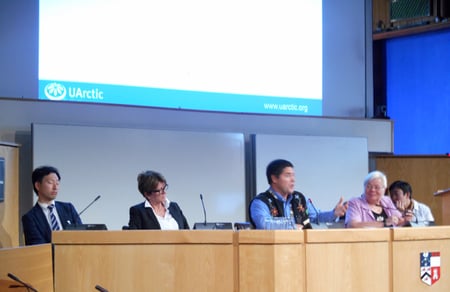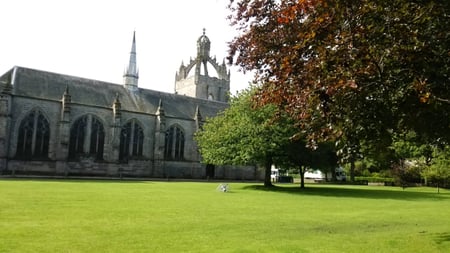How can science, which objectifies the natural environment by separating it from humans, and indigenous knowledge or traditional ecological knowledge (hereafter “local knowledge”), which understand humans as beings that are closely tied to nature, coexist and collaborate?
The above question can often be heard in recent years in the field of Arctic research. The thinking that separates science and local knowledge into two opposites has to do with how humans and nature are interpreted. Science views the relationship of man and nature in dualistic terms and attempts to understand it in a reductive, objective, analytical and mechanistic way. In contrast, local knowledge tends to understand that relationship monistically, in a holistic, intuitive, experiential and spiritual way.
As several past studies have pointed out, this contrast is nothing but a set of differences created through narratives. That is, science does not reject intuition, just as local knowledge does not impede analysis. Nonetheless, the above mentioned division is potentially helpful in the sense that it allows us to use “science” and “local knowledge” as analytical concepts.
From 23 to 25 August 2017 the Rectors’ Forum of the University of the Arctic (UArctic Rectors’ Forum) was held at King’s College, University of Aberdeen, in Scotland, UK. The title of the forum was “The Inhabited Arctic: Lands, Peoples and Scholarship in the Circumpolar North”. The UArctic is a network of educational and research institutions whose goal is a sustainable development of the Arctic region. Hokkaido University is the only Japanese member of the network. At the forum, alongside with the keynote speeches, business meetings and student meetings, three panels were set up to share information and exchange opinions.
- Panel 1: How can disciplines in the natural sciences and in the social sciences and humanities work together to advance our understanding of the circumpolar North?
- Panel 2: How can research best assist inhabitants of the North in responding to the challenges of global environmental change?
- Panel 3: How can the knowledge and wisdom of northern peoples help to shape the agendas for future circumpolar research?
I had the opportunity to hear all the panel debates and take part in the work of Panel 3 as a panelist. I spent a fulfilling time learning firsthand the views of the representatives of universities from the Arctic region (rectors, deputy rectors, functionaries, etc.) concerning the polar studies. The three questions above served to direct the panel debates, either as the common basis or as the departure point for argument. The essential conclusion from those debates is that scholarship should not simply be a pursuit of regular, scientific laws, but should also try to include and understand “irregular” human actions. That may sound a bit naïve, but was, I think, the main stance of the forum.
An example of the attempt to connect science with local knowledge is the so called “The Meaning of Ice” project (“Siku-Inuit-Hila” or in English: “Sea Ice-People-Weather Project”), carried out between 2007 and 2009. The project conducted surveys of the changes in size and mobility of ice in Qaanaaq, Greenland, Barrow (Utqiagvik), Alaska and Clyde River (Kanngiqtugaapik) in Nunavut, by enlisting the help of researchers, hunters and local elderly. Thus, not just social and natural scientists, but the local people too were included in the project from the planning phase. Furthermore, the interviews within the project were not only conducted by outsiders (researchers interviewing the locals), but also by locals (locals interviewing other locals). The project put more emphasis on local knowledge, but was not entirely without problems. There were scholars who understood the local languages, communicated with the locals and acted as a kind of mouthpiece for them, conveying to the public what the locals thought and wanted to say. They came under criticism as intermediaries who took the sting out of the locals’ narrative. However, despite that, in my opinion, at the core of that project was the idea to critically address scientific reductionism present in research, and to protest against scientists who are not interested in local knowledge or only pretend to be interested in it. During my time at the forum, I was thinking how such approach, although not one that I have much affinity for, should not be rejected as old and should always be borne in mind as a possible research stance.
In the run up to the forum, I thought about how we should study the history of the subject area, how we should position ourselves and scientifically study the Arctic, but have not reached a clear conclusion. From the preparation stage, I was mindful of how we should understand the positionality in relation to “facts”, of what is known and what is not, and how the scientific pursuit of regular laws should not be the only approach given legitimacy. As historian Minoru Hokari aptly remarked while he was alive, with a view to criticizing positivistic historical science: “If Jimmy says that a fish flew in the sky, then we can believe that the fish really flew” - we need to think of how to approach experience that science (it is thought) cannot deal with. That is, we need to take the locals’ narrative a bit more seriously, with the entirety of our project in mind, while sharing with others a balanced approach that does not take the sting out of the locals’ narrative. This is probably one of the reasons why nowadays the mutual cooperation of social sciences and humanities, natural sciences and the local people is required in Arctic studies.
Minori Takahashi (Hokkaido University, a member of theme 7)






